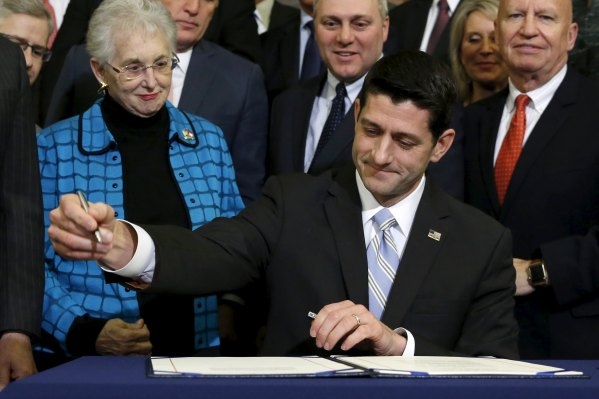Washington Digest: House returns to red meat agenda

WASHINGTON — The House Republican majority opened the second year of the 114th Congress with votes to overturn President Barack Obama’s signature health care law, defund Planned Parenthood, rein in federal regulations and restrain class-action lawsuits.
Among its first actions, the House approved a budget reconciliation bill that cleared the Senate last year — and for the first time sent Obama a bill that would repeal the Affordable Care Act as well as defund Planned Parenthood. Obama swiftly vetoed the bill.
Although Republicans understood their effort would ultimately fail, they nonetheless hailed the fact that a bill repealing Obamacare had made it to his desk. Senate Democrats had thwarted previous efforts to achieve that goal.
“This is a monumental vote. For the first time since Republicans took control of this House in 2011, we are in a position to send a bill to the President’s desk that would dismantle Obamacare and eliminate federal funding for Planned Parenthood,” said Rep. Bradley Byrne, R-Ala. “We should get rid of this awful law and, instead, move forward with health care reform that puts the interests of the patient first, not the interests of the federal government.”
Rep. James McGovern, D-Mass., argued against the effort.
“This is yet another blatant political move by Republicans to appease their right-wing base with no thought for the millions of Americans this bill would hurt. Republican leaders have said it themselves,” he said. “Senate Republican Whip John Cornyn called this ‘a political exercise,’ saying ‘we all recognize the president isn’t likely to sign this bill so it’s not going to become a law.’ Then why on Earth are we wasting the American people’s time with this terrible bill?”
In his veto message, Obama said repealing the Affordable Care Act would reverse gains that have been made in reducing the number of uninsured Americans.
“The Affordable Care Act includes a set of fairer rules and stronger consumer protections that have made health care coverage more affordable, more attainable, and more patient centered. And it is working. About 17.6 million Americans have gained health care coverage as the law’s coverage provisions have taken effect,” he said.
The bill was approved, 240-181. Reps. Mark Amodei, Joe Heck and Cresent Hardy, all R-Nev., voted in favor of it. Rep. Dina Titus, D-Nev., did not vote.
Federal regulations
The House voted 245-174 in favor of the Searching for and Cutting Regulations that are Unnecessarily Burdensome (SCRUB) Act, which proponents said would remove outdated and costly federal regulations.
“One-hundred-and-seventy-five-thousand, two-hundred-and-sixty-five pages of federal regulations are stifling economic growth and opportunity in this country. The SCRUB Act sets up a process to finally review and get off the books and out of the way many of these outdated, burdensome, duplicative and unnecessary regulations,” said bill sponsor Rep. Jason Smith, R-Mo.
Rep. Jared Polis, D-Colo., spoke against the bill, saying it was too arbitrary and broad in scope — advocating instead for a more targeted approach.
“Let’s do it through a legislative approach that targets the authority for a specific set of rules that this body agrees are not necessary or are counterproductive, as we have done in a number of instances, and go after it,” he said.
Amodei, Hardy and Heck voted in favor. Titus did not vote.
Asbestos class action lawsuits
The House voted 211-188 to approve legislation setting new limits on class action lawsuits and establishing additional requirements for those seeking compensation through asbestos trusts that were established in bankruptcy courts to pay out such claims.
The White House issued a veto threat of the bill, saying it would narrow the availability of class actions, potentially dissuading plaintiffs from pursuing meritorious claims, including under important civil rights, privacy and consumer protection laws, and denying them access to justice.
Moreover, the White House argued against requiring additional reporting and disclosure by the asbestos trust system, saying fraud is not rampant and such disclosure would threaten individual privacy and expose asbestos victims to identity thieves and other predators.
Rep. Blake Farenthold, R-Texas, said the additional reporting is needed to make sure that money from the asbestos trusts is not siphoned away through fraudulent claims. He also said the information does not threaten privacy and is focused on ensuring that individuals do not game the system through multiple claims.
“People who are gaming the system (making) multiple claims in state or federal courts,” he said. ” You are only supposed to be compensated once.”
Heck, Hardy and Amodei voted for the bill. Titus did not vote.
Contact Peter Urban at purban@reviewjournal.com or at 202-783-1760. Find him on Twitter: @PUrbanDC.